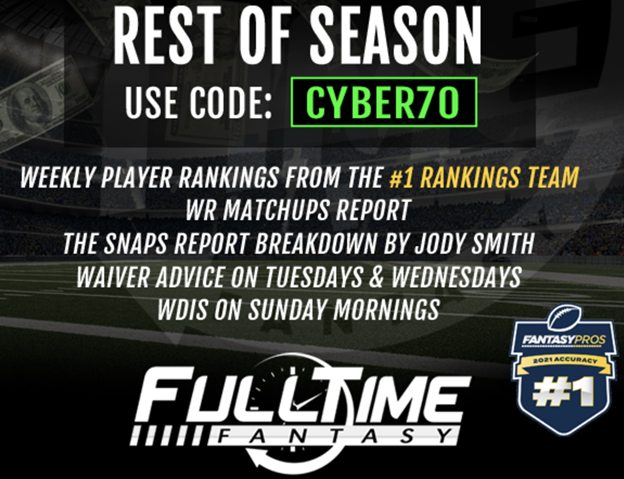
Fantasy owners are always looking for every little edge to win their respective trophies. One thing that many fantasy owners invest their time researching is contract-year players. There is a belief that players tend to perform better when they know they’re playing for a contract the following season, but is there any truth to this?

Join FullTime Fantasy Sports for top advice in the industry from check-cashing, proven winners!
After researching the matter, the answer is not really. Yes, the averages increase slightly overall in contract years, however, it is more than likely due to the fact that the natural progression of the athlete would have them begin to hit their prime in their fourth season, which is when their rookie contracts expire. While fantasy owners focus on breakout stars like Odell Beckham Jr. and Le’Veon Bell who explode right out of the gate, from a big picture standpoint, they are in the extreme minority of all NFL players.
From 2010-2014, fantasy-relevant quarterbacks do see a somewhat significant rise in production during their contract years. Alex Smith, Jay Cutler and Joe Flacco all saw spikes in production; however, these production changes could be attributed to other factors like new offensive schemes, team changes or the addition of key playmakers.
As for skill-position players, the impact of the contract year was minimal. Out of 27 running backs, 14 increased their production while 13 slipped. The wide receivers saw 22 contract-year players improve and 17 decline. Tight ends were nearly split even 7-to-6. So there is not a whole lot of evidence to show that the motivation of money has a momentous impact on their fantasy production. These near 50-percent splits do not suggest a contract year is a factor for improvement.
The elite fantasy starters actually seem to tumble a bit. Of all the players during that time frame that scored 10 or more fantasy points per game, only Demaryius Thomas and Dez Bryant saw an increase in production. The rest (nine players in total) all faltered.

Where you will find a significant impact surrounding fantasy players is in quarterbacks and running backs in their post-contract year. The year after signing a contract both positions tend to fall off, but running backs plummet drastically. They see a 71.2 percent drop in the rankings. However, the drop in running back production is almost certainly associated with age. They see their most noteworthy dips in fantasy production (per touch) at the ages of 25 and 29. Those two ages are often right around the times that backs contracts expire and are renewed. Quarterbacks drop 3.5 spots in the final rankings which is 38 percent of their contract year ranking.
The theory of contract-year motivation will never truly be answered because there is no real answer. First and foremost, you would have to handle this theory on a case by case basis. You would have to understand the psychological makeup of each individual player. To accuse players of not putting forth their best effort at all times would be both negligent and irresponsible. It’s almost certain that some players are motivated by the money. Nonetheless, the majority of these professional athletes are the world’s most-ultimate competitors and many of them wouldn’t let their toddlers beat them at Candy Land. It’s just how athletes of this caliber tend to be wired.
You would also have to take into account the physical durability of each individual player. Different athletes peak and decline at different points in their career. Every player’s body responds different to the grind of an NFL career. Some players are more physically mature coming out of college and others have to develop and grow into themselves. Injuries also must be factored into the equation.
There are just way too many variables to give a definitive answer to the question. Especially an answer that just blankets all players. The evidence we do have would lead us to believe the contract year is trivial, bordering on irrelevant. It seems more like the luck of the draw more than anything else, just like every other player.
From here on out when you are drafting, or just doing research for a fantasy draft, do not waste too much time worrying about player’s contract years (unless of course you’re concerned about a holdout). The impact is insignificant and in the majority of the cases, likely coincidental. In the end, money can be a great motivator and will buy you a lot of things in life, but it can’t buy you fantasy points.




